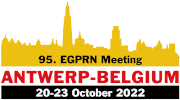Can be improved the screening for obstructive sleep apnoea syndrome in primary care? The Spanish version of the STOP-Bang questionnaire
Jesús González-Lama, Jesús Serrano-Merino, Rafaela Muñoz-Gómez, Esther Navarrete-Martínez, Fátima Silva-Gil, Ana Roldán-Villalobos, Enrique Martín-Rioboó, Javier Ruiz-Moruno, Esperanza Romero-Rodríguez, Manuel Vaquero-Abellán, Luis A. Pérula-De Torres
Keywords: Home Respiratory Polygraphy; Obstructive Sleep Apnoea Syndrome; Primary Care; STOP-Bang Questionnaire.
Background:
Obstructive sleep apnoea (OSA) is a very common condition that has been linked to several diseases and accidents. There is significant under-diagnosis, mainly due to the difficulty of accessing OSA diagnostic tools from Primary Care (PC).
Research questions:
Is the Spanish version of the STOP-Bang questionnaire (SBQ) useful for OSA screening in PC?
Method:
A descriptive study was conducted to validate the measurement instrument. Subjects over 18 years of age who attended the health centre for any reason were included. After completing the SBQ, all patients underwent home respiratory polygraphy (HRP). The SBQ criterion validity was analysed by comparing the SBQ score with the apnoea-hypopnoea index (AHI) obtained by the HRP (OSA was diagnosed if AHI>5). After 1 to 3 months, a subsample of 30 subjects completed the SBQ again, to assess the reliability of the questionnaire, measuring internal consistency and interobserver agreement, as well as concurrent criterion validity.
Results:
255 subjects (54.1% male; mean age 54.8±10 years) from 7 PC centres were recruited. 61.6% (95%CI: 55.6 to 67.6) were diagnosed with OSA. Of these, 22.8% (95%CI: 17.6 to 57.9) had mild OSA (5
Conclusions:
The SBQ has been shown to be useful for detecting moderate/severe OSA in Spanish PC centres. Its psychometric properties are like those obtained in studies conducted in other populations.
Points for discussion:
What screening questionnaires are used in PC in other countries in patients with suspected OSA?
Would it be feasible to perform HRP in PC? Coordination with specialists in respiratory medicine.
What could be the advantages of performing HRP in PC?

